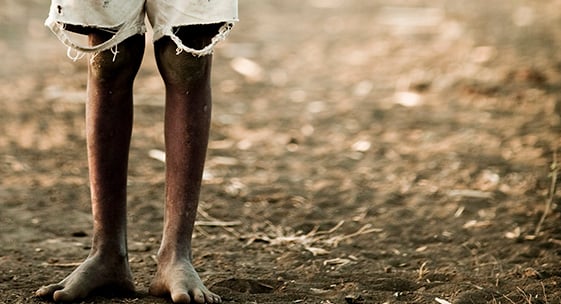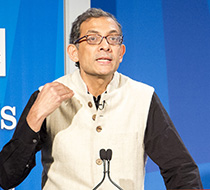
Living in poverty, Tsunza Village, Kenya. Fuel and water subsidies benefit the rich more than the poor,
says MIT’s Abhijit Banerjee (photo: Ignacio Hennigs/Gettyimages)
Rethinking Poverty
August 19, 2016
- Poverty the biggest problem in the world
- More money needed to help poor
- Direct transfers more efficient than subsidies
Anti-poverty programs often fail because of an inadequate understanding of poverty by policymakers. So argues Abhijit Banerjee, Professor of Economics at the Massachusetts Institute of Technology (MIT), who has worked in dozens of countries to better study the economics of poverty. In a recent podcast interview, Banerjee talked about this main theme in his book, Poor Economics: A Radical Rethinking of the Way to Fight Global Poverty.
Related Links
Professor Banerjee also shared his views on policies to help the poor in a panel discussion on sustainable economic development in low-income developing countries , during the IMF-World Bank Spring Meetings in April 2016.
IMF News: Why do we know so little about the more than one billion poor people in the world?
Banerjee: Well, it is very expensive to collect data. To be honest, there are a billion poor people in the world, but how many of us would live next door to them? So, we don’t see them. They are mostly invisible except in their most extreme manifestations—you see the person who is begging in the street, or the person who has made it out of poverty and can tell his own story: “I used to sell tea and now I’m X.” But between those two extremes you often don’t encounter most of these [poor] people; they are not in your life. So, it’s not at all obvious that we have any way of intuitively understanding what’s easy and what’s difficult for people. I think we need data. We need to actually focus on the problem.
“It’s not at all obvious that we have any way of intuitively understanding what’s easy and what’s difficult for people. I think we need data. We need to actually focus on the problem.”
IMF News : In the book’s Foreword you say that “poverty is the biggest problem in the world.” How is poverty the biggest problem in the world?
Banerjee: Let’s say that if you believe that your concept of welfare should be founded in the welfare of people as opposed to religiosity, beauty, or other things, and if you think that the living standards of people are the primary determinant of welfare, then I think it’s obvious that this is where the biggest losses are.

IMF News : You also speak a lot about poverty traps. Do you think there are circumstances in which people or groups of people do, in fact, find themselves trapped in poverty?
Banerjee: There are two answers to that question. One is: do I believe it is true? Yes, I believe it’s true. Do I have any very well-founded reason to believe it’s true? Much harder question. I would say the evidence on these interventions—which help people today and many years later they are still richer—suggests that there might be a trap [for the poor], because if there wasn’t one, you would think that [the people who were helped] would fall back [into poverty].
If it were the case that some people are doomed to be who they are and some people are just poor because they are unskilled or undisciplined or not hardworking enough, then you would imagine that you couldn’t get them out of poverty by doing something today, because tomorrow they will still be lazy and will go back to where they belong. I think the evidence suggests that this is not true, that many people are in a situation where, if given an opportunity, they would be in a different place.
IMF News: So, if people are given more opportunities, the more successful they might be at pulling themselves out of poverty?
Banerjee: Sure. If you think you can identify a particular reason for a trap—which I think is not easy—but if you could, then it would be great because the interventions I talked about earlier are very broad-brushed. You can give the poor training, some money or assets, or other things, and the hope is that one of them will stick. And if you had a much better understanding of exactly what was sticking and you could identify, for instance, that for Joe it’s money, but for Jane it’s confidence, then you would give Jane confidence and Joe money and things would work better, and you would save resources. I’m less optimistic that we will get to that level of sophistication, but one shouldn’t let the perfect be the enemy of the good.
IMF News: How important do you think money is when we’re talking about aid and sustainable development?
Banerjee: Aid is a slightly tricky word here, because aid often is interpreted to mean foreign aid, like aid sent by advanced countries to poor countries. It is a very small part of social support even in the developing world. Most of the money spent for social support is spent by local governments and local charities. All of these are bigger than aid. So let’s define it to mean money rather than aid. And money is very important.
I think the idea that you could help poor people without spending any money—that was the kind of promise of micro-credit, which is that it’s essentially a matter of lubrication. I think that turns out to be mostly false. So, I would say lubrication is not a substitute for resources. Real resources count. Better quality education, more assets for poor people—those things are real money, and real money needs to be spent.
“Real resources count. Better quality education, more assets for poor people—those things are real money, and real money needs to be spent.”
IMF News: And how effective are we at raising and distributing that money?
Banerjee: We are not very good at raising the money. We’re not very good at distributing the money. That said, with the money we have, we often give it away to the wrong people. The first thing to fix would be to stop giving the subsidies to the rich, which is a very large part of the problem. If you did manage to take away the subsidies from the rich, I think you would have lots of money for the poor. However, it is very political; it is difficult to get subsidies away from the rich. This is a sad leftover from the 1970s and 1980s, when this was the politically preferred instrument of transferring resources, and those subsidies have become a real problem for many countries.
IMF News : You’re talking about direct transfers rather than subsidies? Essentially, that this is a more efficient way of distributing money?
Banerjee: Absolutely, especially since power and water are often subsidized—they are extraordinarily distortionary, they have environmental consequences that are disastrous, and they are inequitable. People who have large power-using machines tend to benefit from power subsidies more than anyone else, so yes.
IMF News : What do you think that we really need to do in the longer term in order to improve the lives of so many people, and how likely do you think it is that the next generation of aid workers and philanthropists will get it right? What will it take?
Banerjee: I think there is a fast-growing body of evidence that is much more reliable than we ever had, and more categorical, on what are really stupid things to do and what actually works. I think that train has left the station and it’s good because it is penetrating levels of policy. Now, how long will it take? It will take a while to penetrate down to the government bureaucrat who decides on a program. The bureaucrats have their own entirely unwarranted opinions on things and we struggle with that all the time. We work a lot with government bureaucrats, some of whom are wonderful and some who are desperately opinionated with no warrant. It is a battle. We have made a lot of progress, but I do feel that it’s going to be a long battle.


